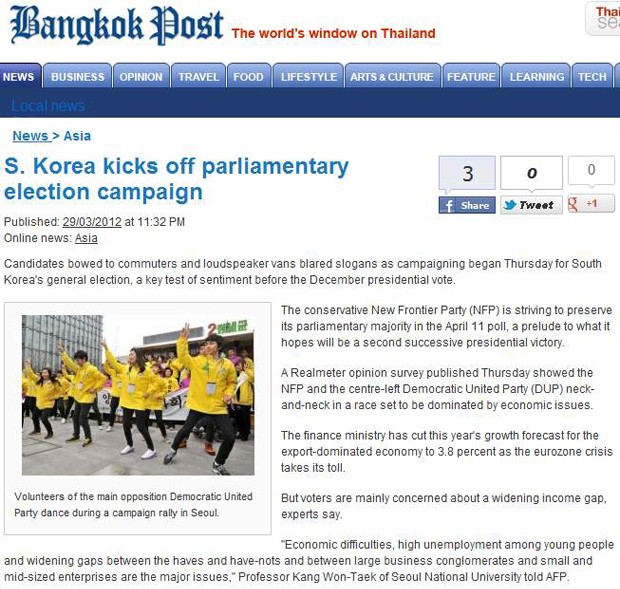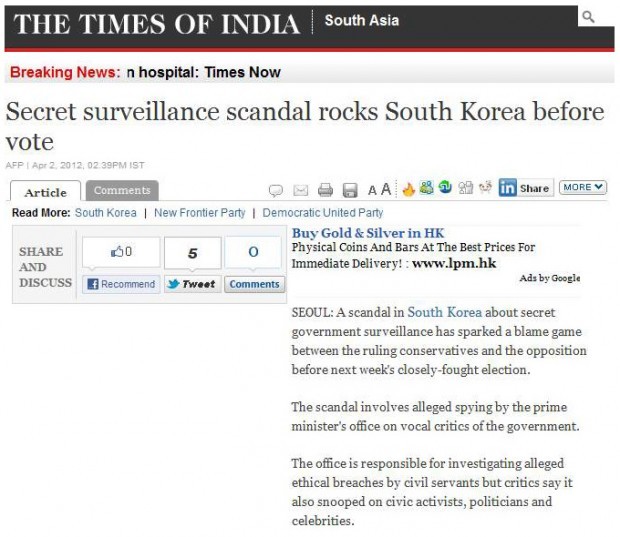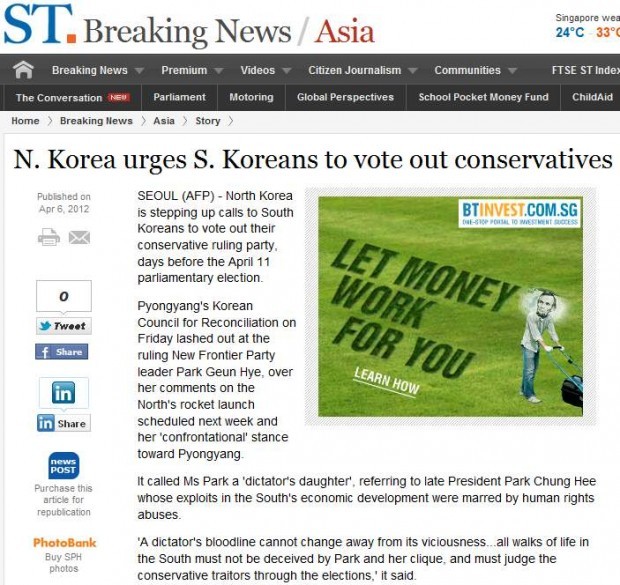Asian media’s views toward the South Korean general election
A total of 300 new members of representatives are to be elected in the 19th general election. Five-year term presidential election is also scheduled to be held at the end of this year. The four-year term parliamentary election and the presidential election are set to held in the same year for the first time in 20 years.
The presidential elections in Taiwan and Russia were held in January and March respectively this year.
The major elections held this year in various countries are expected to exert some forms of influence on world situations. In connection with this, The AsiaN looked into the general views of the Asian media on the South Korea’s April 11 general election.
The Asahi Shimbun of Japan said that “taking a snapshot at polls and post them on the Social Network Service(SNS) including facebook will be popular among the young voters in this election as a means to ask other youngsters to vote. That has become possible as a result of court ruling last year that has made the election campaign through SNS legitimate. Considering the fact that Koreans like to take pictures of their own while doing something, voters turnout will grow owing to the the SNS.”
“A lot of short messages like “it was the first time in my life to vote, but I feel good,” or “please don’t fail to vote” were seen posted on the SNS after the absentee voting which took place a few days ago. The messages apparently soilciting to vote were sent together with pictures showing their shapshots at polls. It used to be illegal in Korea to stage election campaign through SNS like in Japan. But, the Constitutional Court of Korea has made it legal in a ruling last December,” the paper said.
It continued that “SNS are being used extensively by candidates as a means to deliver their commitments or by the campaigners to support certain candidates in this election. The turnout of voters in 2008 general eleecion stood at 46.1 percent. But, the rate among those in their 20s was only 28.1 percent. The trend of being indifferent to elections among the youngsters is similar to that of Japan.” The leading Japanese newspaper wondered if Korean youngsters’ fondness of taking snapshots could be linked to hike the turnout of voters.
The Nihon Keizai Shimbun said in its commentary that “which party would win the general election will be decided in the early morning of Thursday (April 12). The result of the election will form the new parliamentary power trend in the coming four years. Furthermore, the result will have tremendouse impact on the presidential election slated for December this year.”
The paper also said, citing Korean media, “it is extremly hard to predict which party would win the election as the candidates in some 70 constituencies including 50 in capital regions are in a state of neck-and-neck. The candidates from opposition camp criticized the ruling camp for having widened the economic disparities among the people. Meanwhile, the ruling camp candidates attacked their opposition party, calling it irresponsible due to its promise of renegotiating the Korea-U.S. FTA, already ratified between the two nations, when it comes to power.” The economic daily also predicted that “when and if the opposition camp win the election, the economic policy of the current regime favoring the big businesses would have no choice but to be changed to some extent.”
The Bangkok Post of Thailand said in a report on March 29 that “hectic confrontations are being waged between the ruling and opposition candidates in the general election to seize the power in the parliament. Major issues being surfaced in the campaign include high unemployment rate, growing disparity between small and large businesses as well as income disparities between the have and the have-not. Strange thing is that the North Korean move of launching satellite around April 14 has not become a hot campaign issue while major economic issues have come forward as core matters in the election.”
The Times of India said in its report on April 2 that “the government’s illegal inspection on innocent citizens, unearthed lately, is trembling the South Korean politics with an expectation of rendering a great deal of impact on the general election. The ruling and opposition camps are bitterly denouncing against each other in conscious of the impact the illegal inspection would have on the election.” The paper also said “the matters concerning illegal inspection on private citizens are very sensitive in Korea because the history of political democracy in South Korea is not quite long. It was only in 1987 when democracy has set foot.”
The Straight Times of Singapore reported on April 6 that “The North Korea was said to have asked South Korean people to sweep out conservative politicians in the election. The North also denounced Park Kun-hae, leader of the ruling Saenuri Party, for having criticized the North Korean move of launching satellite. Calling her as the daughter of dictator, the North called on the South Korean people to judge Park and politicians supporting her through the election.






























































